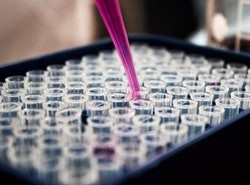
New therapeutic approach for treatment-resistant estrogen receptor positive breast cancer
Published: 04/30/24 8:27 AM

Nicole Verrills
Project Description:
Estrogen receptor positive breast cancer is the most diagnosed breast cancer subtype accounting for around 80% of all breast cancers. While standard of care therapy, which involves endocrine therapy, is beneficial for most patients, around 30% of patients are resistant to treatment which can lead to metastatic disease, the primary cause of breast cancer mortality. A/Prof Nicole Verrills and the team have discovered that estrogen receptor positive breast tumours that are resistant to endocrine therapy have low activity levels of a protein called PP2A. A medication currently used for the treatment of another disease is known to increase the activity of PP2A. In this NBCF-funded study the team aims to examine whether this medication can be repurposed for treatment resistant estrogen receptor positive breast cancer. With the use of preclinical models this study will evaluate the ability of this medication to enhance the responsiveness of estrogen receptor positive breast cancers to endocrine therapy.
Why is this work needed:
Estrogen receptor positive breast cancer is the most commonly diagnosed subtype of breast cancer and while most patients will benefit from endocrine therapy, resistance to these drugs occurs in around 30% of patients which can lead to metastasis, the primary cause of breast cancer mortality. Hence, new treatment approaches for endocrine resistant estrogen receptor positive breast cancers are urgently needed.
Expected outcomes:
Successful outcomes of this study will validate, in preclinical models, a potential novel combination treatment strategy using a PP2A activating medication, for endocrine therapy resistant estrogen receptor positive breast cancer. This will provide the evidence needed to proceed to a clinical trial of this medication in patients with endocrine resistant estrogen receptor positive breast cancer.
Project description:
Breast cancer ranks as the second most frequently detected cancer in women in Australia, with over 20,000 diagnosed annually. Estrogen receptor positive breast cancer is the most diagnosed breast cancer subtype accounting for around 80% of all breast cancers. Patients with estrogen receptor positive breast cancers are commonly treated with endocrine therapy to block fuelling the growth of the cancer cells. While some patients respond to endocrine therapies such as Tamoxifen, up to 30% of patients are either inherently resistant or acquire resistance to treatment over time. Resistance to treatment inevitably results in relapse and metastasis, leading to death.
A/Prof Nicole Verrills and the team from the University of Newcastle have discovered that reduced activity of a protein called PP2A, is linked to resistance to endocrine therapy, and is associated with disease relapse and poor outcomes for estrogen receptor positive breast cancer patients. A medication currently used for the treatment of another disease is known to increase the activity of PP2A. Preliminary studies from the team found that this medication prevented the growth of estrogen receptor positive breast cancer cells cultured in the laboratory.
With the use of preclinical models this study will evaluate the ability of this PP2A activating therapy to enhance the responsiveness of estrogen receptor positive breast cancers to endocrine therapy, thereby leading to clinically relevant outcomes.
This innovative study has the potential to identify new approaches to treat estrogen receptor positive resistant breast cancer, and ultimately lead to improved survival for breast cancer patients.
